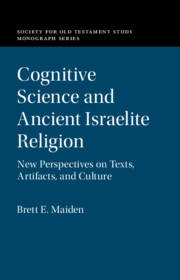Book contents
- Cognitive Science and Ancient Israelite Religion
- Society for Old Testament Study Monograph Series
- Cognitive Science and Ancient Israelite Religion
- Copyright page
- Contents
- Figures
- Tables
- Acknowledgments
- 1 Intuitive and Reflective Cognition, Optimal and Costly Religion
- 2 Rethinking the Popular–Official Religion Dichotomy
- 3 Deuteronomic Theology as Cognitively Costly Religion
- 4 Counterintuitive Mischwesen
- 5 On Artifacts and Agency
- 6 Ritual and Cognition in Leviticus 16 and the Day of Atonement Ritual
- 7 Conclusion
- Bibliography
- Index of Biblical Texts
- Subject Index
6 - Ritual and Cognition in Leviticus 16 and the Day of Atonement Ritual
Published online by Cambridge University Press: 17 September 2020
- Cognitive Science and Ancient Israelite Religion
- Society for Old Testament Study Monograph Series
- Cognitive Science and Ancient Israelite Religion
- Copyright page
- Contents
- Figures
- Tables
- Acknowledgments
- 1 Intuitive and Reflective Cognition, Optimal and Costly Religion
- 2 Rethinking the Popular–Official Religion Dichotomy
- 3 Deuteronomic Theology as Cognitively Costly Religion
- 4 Counterintuitive Mischwesen
- 5 On Artifacts and Agency
- 6 Ritual and Cognition in Leviticus 16 and the Day of Atonement Ritual
- 7 Conclusion
- Bibliography
- Index of Biblical Texts
- Subject Index
Summary
This final chapter offers a sustained textual analysis of the Day of Atonement ritual in Leviticus 16 and theorizes the effects of ritualized behavior and cognitive and material costs associated with the ritual ceremony. Several important theoretical frameworks from the cognitive science of religion (CSR), which aim to study different aspects of religious ritual in particular, are introduced and applied to the biblical text. These include Lawson and McCauley’s ritual form hypothesis, Whitehouse’s modes of religiosity, Boyer and Lienard’s notion of ritualized behavior, and others. These cognitive theories offer a new set of questions and methods for approaching ritual in ancient Israel, departing from more traditional ritual theory. The chapter analyzes the purification or purgation of the temple and the scapegoat ritual using these theories.
Keywords
- Type
- Chapter
- Information
- Cognitive Science and Ancient Israelite ReligionNew Perspectives on Texts, Artifacts, and Culture, pp. 211 - 256Publisher: Cambridge University PressPrint publication year: 2020

